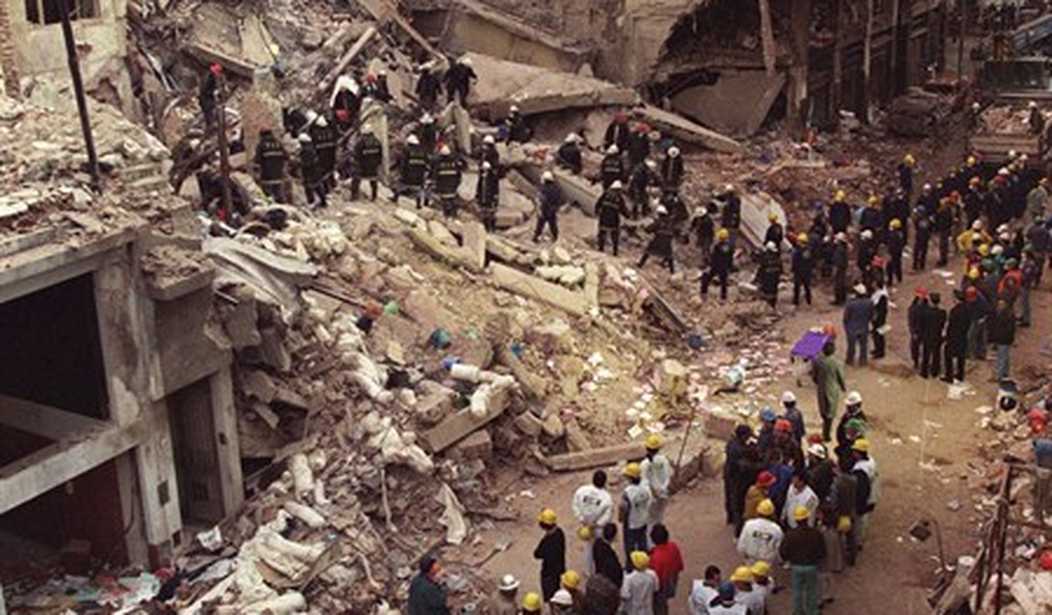Thursday marks the 30th anniversary of one of the deadliest terrorist attacks to be carried out in the Western hemisphere. The bombing of the Argentine Israeli Mutual Association building on July 18, 1994, claimed 85 lives and left a trail of scandal in its wake which is still having repercussions to this day. No one has ever been held legally accountable for the incident, though it has become increasingly apparent over the past three decades that the attack was planned by the Iranian regime and carried out by its Lebanese proxy, Hezbollah.
There were several other attacks in the 1980s and ‘90s that fit the same description and although the tactics of the regime and its terrorist agents have changed with time, the threat of their attacks has never gone away. I should know. Just last November, I narrowly avoided an attempt on my own life which clearly fit the modus operandi of mercenaries in Tehran’s employ. My would-be assassin approached me outside my home in Madrid and fired a single shot at my head before fleeing on the back of a motorcycle driven by an accomplice. If I had not turned my head in response to the gunman’s voice, I would have been killed on the spot.
There is a long history of motorcycles being used in assaults and assassinations by Iran’s hardline paramilitary, the Islamic Revolutionary Guard Corps and various criminals who it has contracted to carry out its work far from Iran. While the investigation of my attack is still ongoing, three individuals were arrested soon after and Spanish authorities are currently pursuing the extradition of three other persons alleged to have been involved in preparing and financing the operation. The information that has come to light so far points to a multinational network obscuring the plot’s origins, but there has never been any doubt in my mind that it was ordered by Tehran.
As I told investigators immediately after I’d undergone surgery to remove the bullet and repair my shattered jaw, I have no other enemy but the Iranian regime. In fact, I have the distinction of being among the first European politicians to be included on that regime’s formal enemies list, on account of my long standing support for the coalition of pro-democracy opposition groups known as the National Council of Resistance of Iran (NCRI). As head of the International Committee In Search of Justice, I have been heavily involved in efforts to bring to justice the Iranian officials involved in the mass execution of political prisoners in 1988, which primarily targeted members of the NCRI’s main constituent group, the People’s Mojahedin Organization of Iran (PMOI/MEK).
Recommended
In the wake of the attempt on my life, I remain as committed to that cause as ever. But the attack has also inflamed my passion for bringing attention to the history of Iran’s outwardly directed political violence, the lack of accountability that has followed and the sense of impunity that this has encouraged in high-ranking Iranian officials and institutions like the IRGC and the Ministry of Intelligence and Security.
Because of that impunity, it is vitally important that the international community take measures to prosecute past instances of Iran-backed terrorism and to illustrate the consequences that the regime will face for new operations in the future, whether carried out directly by regime operatives or channeled through its proxy networks. In absence of this deterrence, the next individual to be targeted by them may not be as lucky as I was and it may not be long before Tehran orders another attack on the scale of the AMIA bombing.
Indeed, it has already done just that in recent years, though Western intelligence and law enforcement has thus far succeeded in thwarting the attempts. In June 2018, an Iranian diplomat named Assadollah Assadi was identified as the mastermind of a plot to set off explosives at the annual gathering of Iranian expatriates that had been organized near Paris by the NCRI. Had Assadi’s accomplices not been detained at the border, the bomb in their possession had the potential to kill hundreds, if not thousands of people, including any number of Western political dignitaries who had been there to show support for the cause of Iranian democracy.
Assadi was eventually found guilty by a Belgian court and sentenced to 20 years in prison for plotting to commit terrorist murder. But in a demonstration of unfortunate European tendencies toward appeasement of the Iranian regime, he was released in a prisoner swap earlier this year. This was ironically around the same time that the Argentine Court of Cassation issued a ruling on the AMIA bombing, officially stating that the attack had been planned by Iran and thus potentially advancing the cause of real legal accountability.
Then again, several Iranian officials have been subject to Interpol red notices in connection with the incident since 2007, including the current Interior Minister Ahmad Vahidi and yet little apparent effort has gone toward acting upon them. This speaks to a general lack of collective political will to demand Tehran’s accountability. That same lack of will is reflected in the foot-dragging and excuses from European and British political leaders who have faced growing pressure from their own colleagues to follow the lead of the United States in designating the IRGC as a foreign terrorist organization.
Even when the US took this step in 2019, it was already long overdue. The 30th anniversary of the AMIA bombing is a stark reminder of how long the victims of Iranian terrorism have been waiting for justice and of how long the regime’s critics and enemies have been forced to live under an ever-present mortal threat.

























Join the conversation as a VIP Member